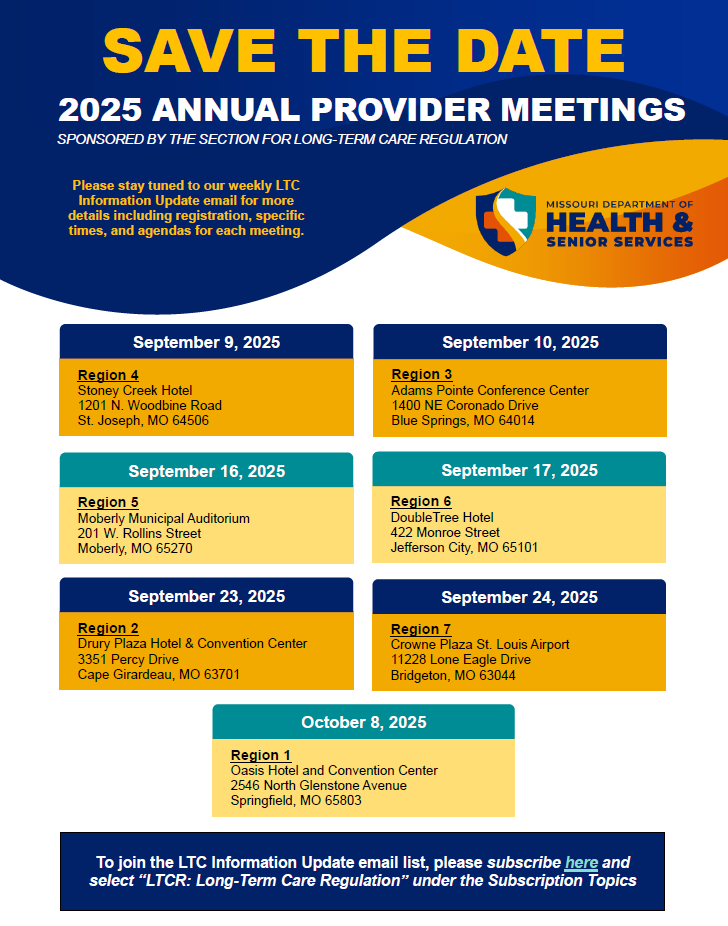In July 2025, the Department of Health and Senior Services Central Office Medical Review Unit (COMRU) and the Department of Mental Health (DMH) made changes to the processing of Pre-Admission Screening and Resident Review (PASRR) Level 1 applications that indicated a Level 2 evaluation should be completed. The goal of these changes was to streamline the process and to decrease the review time for these applications. This goal was accomplished, and applications are currently being reviewed by COMRU and sent to DMH within two working days of receipt.
To further enhance the efficiency of the process, effective October 1, 2025, Bock Associates, the DMH contractor that completes the Level 2 evaluation, will also begin conducting the level of care (LOC) on applications that indicate a Level 2 evaluation is needed. The LOC for these applications is currently conducted by COMRU following the Level 2 evaluation. In addition to further streamlining the process, this change will enhance the quality of the review as most of the Level 2 evaluations are conducted in person. In addition, any issues, questions, or corrections can be addressed immediately without the back-and-forth process that is currently in place. COMRU will work closely with DMH and Bock Associates to ensure a smooth transition.
COMRU will continue to conduct the LOC review for Level 1 applications, applications DMH determines “No Level 2 Required” (NL2R), applications Bock Associates determines did not meet the federal requirement, and Special Admission Category (SAC) applications. The change to the process will also improve the timeliness of these reviews.
This change will have no impact on the application or on the submission process.
Tips and Reminders
COMRU does receive several applications that do not indicate a Level 2 evaluation based on the responses on the application, however a review of the application and attachments/supporting documentation shows the application should have indicated a Level 2 evaluation. Often, the individual has already been admitted to a nursing home and payment to the nursing home may be delayed until the Level 2 evaluation is complete. A good refresher on the conditions that indicate a Level 2 evaluation can be found here. Please ensure a thorough review of the application and supporting documentation when making admission decisions. An additional tool that will aid in decision-making is a review of the information in CyberAccess. CyberAccess offers many services to providers, such as where Medicaid clients have been receiving services, billed diagnosis and much more. To register for CyberAccess, please contact 888-581-9797.
Section D – Level One Screening Criteria for Serious Mental Illness
- Question 2 – Depression is often listed under this question, but it should not be included. A diagnosis of depression is different from a diagnosis of major depressive disorder.
- Question 6 – Please review carefully to ensure this question is answered correctly. Incorrect answers will be returned for correction.
Section E – Level One Screening Criteria for Intellectual Disability or Related Condition
- Question 2a – Thoroughly review all diagnoses listed, including those in purple text. In addition, diagnoses of traumatic subdural hemorrhage, traumatic subarachnoid hemorrhage and anoxic brain damage should be listed under head injury/traumatic brain injury (TBI). Please review carefully to ensure this question is answered correctly. Incorrect answers will be returned for correction.
Nursing Facility Level of Care Assessment
The LOC application is used across different settings, including approval for Home and Community based services. The application is an evaluation of the applicant’s current needs. Questions regarding Eating, Meal Preparation and Medication Management should be answered based on the applicant’s ability to complete these tasks, not on what services the nursing home provides. While residents of nursing homes do not normally prepare meals or manage their medications, the appropriate evaluation of these items is required. When answering these questions, it may be helpful to review the assistance needed in other areas, including other ADLs and the applicant’s cognitive status, to determine the most appropriate answer.
Section C – Recent Medical Incidents
- All attachments must be in PDF format.
- The applicant’s name must be listed on all attachments.
- It is not necessary to list diagnoses if a diagnosis list is attached.
- For Level 1 applications, it is not necessary to attach a H&P if the date and reason for hospitalization is explained in the comment section.
- For Level 1 applications, the H&P should be limited to the date/reason for hospitalization. Applications that indicate a Level 2 require additional information.
Section D – Assessed Needs
- Behavioral:
- “Date of last consult…” is a psychiatric consult, if conducted. This should not be completed for a medical visit.
- If behavior symptoms are checked, please review response – this would be either 3 (past) or 6 (current) points.
- Mobility:
- Describe the assistance required, rather than simply listing mode of locomotion. For example, do not just list wheelchair/walker.
- Rehabilitative Services:
- Scoring should be all frequencies added together.
- Safety:
- This question is a two-tiered evaluation. First, a preliminary score is determined based on vision impairment, fall history (within the last 90 days), and problems with balance. After the preliminary score is determined, additional points are given for prior institutionalization (within the last 5 years) and age of 75 years and over. No points are given for the current nursing home admission and the dates for the current admission should not be listed.
For additional information, including training opportunities, visit the COMRU Website.

